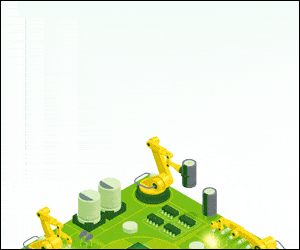Do you have the right qualifications?
“For starters, one must have the basic diploma or degree in electrical, electronics or instrumentation engineering. There have been a few exceptional cases of mechanical, production or chemical engineers also taking the initiative to master automation and controls,” informs Sawant. Bhatt says, “Candidates with an M.Tech in automation and control or in instrumentation also have significant opportunities to play a specialised role. Increasingly, business analysts with a clear understanding of the industry domain and factory floor/field operations will play a crucial role in defining user requirements.”
Talking about qualifications, Sharma says, “B.Tech is a compulsory course for all the engineers, but depending on which field you would like to opt for, you can go for a diploma in the same. Also, those with an MBA in sales and marketing can opt for sales or marketing to enter the automation industry.”
Fine tune your skills
Students interested in a career in control and automation must have a strong understanding of the fundamentals of control theory as well as advanced topics like Distributed Control Systems (DCS) and Programmable Logic Controllers (PLC), informs Bhatt. He says, “They should be comfortable with concepts in pneumatics, hydraulics and electro-mechanics. Programming skills in C, Fortran or VB are also essential.” He adds, “Knowledge of MATLAB and LabVIEW will help a student in modelling and simulation of control and automation systems. These packages are also widely used in the industry and will therefore help students in day to day tasks as well.”
[stextbox id=”info” caption=”Excerpts from a discussion on ‘The lack of young engineers in control and automation engineering’”]
“The problem is we have too many of what I call automation engineers who lack the background to understand what they are automating. Young engineers should get operations’ experience and field experience before launching into this side of the business because they fancy writing programs.
“I would suggest to anyone who wants to enter this field to get some operational experience. I believe it’s actually good for any young engineer to get some operational experience before they start any kind of design type of work. Getting involved in plant start-ups is probably the best of all, provided you have some experience around you. I once worked in a ‘plant start-up’. The process was unique, but almost all the engineers involved were a bunch who had less than five years’ experience. It never made it to production and the key reason was the lack of experience, coupled with a lack of leadership. Start-ups can be gruelling and the more experienced folk tend to not like it, especially when all the overtime is unpaid, but the experience rewards can be substantial.”
—Will Wagoner P.E., consultant at Infilco Degremont Inc, USA
“The industrial companies would prefer outsourcing the automation package rather than do it by themselves. Due to this popular business model, young engineers rarely have the chance to know both. Probably only our company insists on developing automation packages by itself, and by previous production engineers.”
—Zhangjun (Jack) H., senior process automation engineer, Dow Chemical, USA
“I have been often working on both sides of the ‘barricades’ as a pure IT architect for large blue chip companies and am a ‘hands-on’ innovative automation solutions practitioner. I’ve realised that automation (is) becoming more and more amalgamated with traditional IT conception. But the problem here is that for many of the traditional, great automation practitioners and providers, this reality requires a paradigm change and they find themselves in the unfamiliar territory of software development …. at least to some degree…”
—Ilya K., domain architect / technical project manager at IKS Automation, Australia
“Of course as a passionate controls enthusiast I would like to see everyone become a controls engineer. It is one of the most dynamic and challenging fields that exist, in my opinion.
The main thing is for engineering students to be interested in control. Getting that done requires programs and teachers who can show how critical control systems are to industry and pass on the passion. This field has always been multi-disciplinary, and it will continue to be the same in the future. As the needs increase we will have to move away from the ‘know-it-all, do-it-all’ engineer, to a team that can accomplish the work together. For example, CS/IT people to program the front-end HMI tools; engineers (electrical, mechanical, chemical, etc) to develop control strategies and algorithms that take the process into consideration; and instrumentation/electrical specialists to solve the difficult sensing problems. Of course, someone can know a little about all of these things but for a truly great product, you need to put a team together.”
—Brett I., process control engineer at Corning Incorporated, USA
[/stextbox]
According to Partamita Kapat, typically, an automation engineer must have knowledge of electronics and mechanical systems, programmable logic controllers (PLC), interfacing technologies such as protocols, signal types and levels, and application programming or product solutions on PCs.
The remuneration
A fresh B.Tech/BE engineer can expect a compensation of approximately Rs 300,000 per annum while an M.Tech engineer will get around Rs 400,000 per annum.
The author is a tech correspondent at EFY Bengaluru










